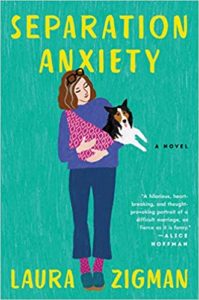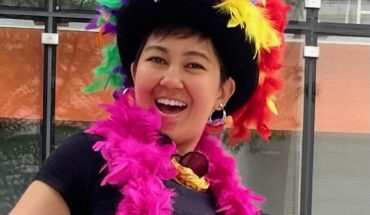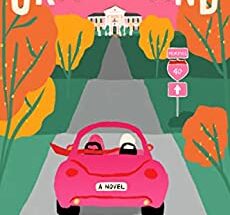 I have a book on my shelves titled Animal Husbandry that makes me smile every time I catch sight of it. Someone, likely thinking I’d find it apt because I grew up on a farm, gave it to me at an intense time of my life when I really needed a laugh. And did I ever laugh. So, when I learned that its author, Laura Zigman, was coming out with a new novel, I leapt at the chance to interview her for Dead Darlings. I won’t lie; part of my motivation was to snag an advanced copy and read it before all of you.
I have a book on my shelves titled Animal Husbandry that makes me smile every time I catch sight of it. Someone, likely thinking I’d find it apt because I grew up on a farm, gave it to me at an intense time of my life when I really needed a laugh. And did I ever laugh. So, when I learned that its author, Laura Zigman, was coming out with a new novel, I leapt at the chance to interview her for Dead Darlings. I won’t lie; part of my motivation was to snag an advanced copy and read it before all of you.
And boy am I glad I did. Separation Anxiety serves up the perfect antidote to our anxious times. Judy Vogel’s life hasn’t gone according to plan. Her career is in the dumps, her son no longer cares to spend time with her, her best friend is dying and she’s trapped in a house with her pot-addled husband because she can’t afford a divorce. When she stumbles across an old baby sling in the basement, something in her snaps. Judy puts the dog into the sling and feels connected to another living being for the first time in a long while.
Even before we were all captive in our homes due to a pandemic, Laura Lippman called Separation Anxiety “the book everyone needs right now.” I’d go a step further and say the governor should make it required reading. Oh, a word of warning: don’t try the sling thing with your cat. Or at least a cat like mine.
SHARISSA JONES: You do a masterful job of weaving flashbacks and back story into the fabric of the novel. The reader needs so much of this information to understand how Gary and Judy have wound up where they are. You’ve talked before about how you often write without a clear structure in mind. How did you determine when and where to give the reader the necessary background information?
LAURA ZIGMAN: I’m glad you thought it worked! I’m very much an instinctual writer – I just kind of sense when and where a detailed flashback should go. It’s almost like a pause in a conversation, when a friend is telling me a story and all of a sudden I have a zillion questions: How did the couple meet? What did they see in each other? How did they get to be who and where they are right now? I may not ask all those questions, but they’re things I’m always definitely curious about when I’m thinking about people and their relationships and marriages. When I’m writing one of those background moments, that’s what it’s like for me: It’s like interrupting myself to tell someone the really important stuff about people they’ve never met.
Your poor protagonist. At the beginning, Judy is in such a bad state that the only thing that makes her feel better is wearing her dog in a baby sling (the neck ache alone!). Then you really start turning the screws, making it worse and worse for her. A common theme in the novel incubator is that we are seemingly always pushing one another to torture our characters more. Was there ever a moment you wondered if you were going too far or not far enough? How did you strike this balance?
Of course I did! One of the first people I showed an early draft to said: “It gets funny, right?” I was like, “It definitely does!” But at first: it’s sad. I really really wanted to be true to that sadness, that unbearable heaviness of being that no one ever really wants to talk about because I think that’s one of the reasons we’re all so sad: no one wants to give us the time and space to talk about these things. There’s an enormous pressure in our culture to “get over” loss and death and sadness and depression. To “move on.” Judy has not gotten over things; she has not yet moved on. She may not ever do either. I wanted to start the novel in this particular moment – a kind of still-point, when it feels like your whole world has gone dark – so that the movement forward would feel so stark. By the end of the book, Judy doesn’t get everything she wants. In fact, I don’t think anything changes that much for her except her ability to live in a hopeful light. That, compared to the beginning, is huge. Now, that said, of course I worried about making the story too grim. But I just decided to trust the fact that I could strike a balance with everything else that was going on.
A major theme throughout the book is what costumes we wear or reject in our lives. Did you begin with the thought it would emerge in so many different configurations or did it come to the fore more organically?
I think that’s one of the magical elements of writing fiction. Things happen that you don’t plan. I certainly didn’t plan on making that point, but it definitely became a theme I think because the idea that Judy is at a point where she just doesn’t care anymore what she looks like or what people think. She knows that wearing the dog is weird and that it bothers her son and, to a lesser degree, her husband, She knows and while she wishes she could stop – for her son’s sake – she can’t. She is trying to survive this painful period in her life and if it takes wearing a dog in a baby sling to do it, that’s just what’s she’s going to do.
Each of your novels has an absolutely fantastic voice and Separation Anxiety is no different. In fact, one might argue that you pull off some preposterous plot points through the strength of that voice. Yet, I was stunned to learn that you ghosted Eddie Izzard’s book, a book in which his voice seems all his own. How did you shift so adeptly?
I think voice is everything (okay, well, almost everything – unfortunately, we still have to always figure out plot!). For me, when I’m reading, I want to be able to hear that voice in my head – that voice is what takes me through the story and everything that happens in it. Until I have it, I don’t have anything. Ghostwriting is the same thing, essentially: You have to tell someone else’s story, but you have to tell it in their voice. It’s not journalism; it’s not writing a story about them. It’s telling their story the way they would if they could write it themselves. Eddie Izzard is a perfect example of that because he has such a singular voice. When you’re a novelist, that’s one of your skills – writing in different voices – and it’s one of the most important parts of the process of ghostwriting: getting the voice 100% right.
A number of years passed between this novel and your previous, Piece of Work, in 2006. We all know that writing a novel requires so much blind faith. Was it difficult to summon it again to return to the novel form?
It was so hard. Incredibly hard. For so many years – a little over a full decade – I didn’t attempt another novel. I just didn’t have the confidence, the belief in myself to be able to do it again and do it well. And I really really wanted to do it well. About 5 years into my writer’s block I started making a series of short videos using the Xtranormal platform, which was free online software that allowed you to write a script, pick your animated characters, direct their facial expressions, and post a finished scene within minutes. I called them Annoying Conversations and I made 75 of them. It was instant gratification and I quickly realized that what I loved about making those short videos was that for those few minutes every morning I forgot that I had writer’s block. I could sit down, write 2-3 minutes of dialogue, edit it a few times (it was always a challenge to time the perfect eyeroll), and essentially post a scene on Twitter and Facebook without agonizing. It was a painless way to write. I think it was one of those tiny steps I took during my 14-year dry-spell to try to trick myself into writing.
Okay, I have to ask: where in the dark recesses of your imagination did the People Puppets originate? I’m hoping that they’re not based on any real-life experiences some of us might encounter in the course of our kids’ educations.
I like to think I’m imaginative but had my son’s Montessori school not had a two-week residency with People Puppets (one year it was Circus Smirkus; another year it was an African drumming troupe), I don’t think I ever could have made them up. I knew when I got the email from the school announcing their selection for that particular spring that I would have to write about it. Someday.
Your early book, Animal Husbandry, was heralded as one of the first big “chick-lit” books, coming shortly on the heels of Bridget Jones’s release. Though wildly popular and applied liberally to many different writers, the term feels different today in the post #MeToo era. Have your views on “Chick Lit” changed over time? How do feel about it now?
Animal Husbandry was about what it was like to date, get dumped, and be heartbroken in New York. When I wrote it, all through the mid-1990s, and when it was published, in 1998, Chick-Lit didn’t exist. It came out and was reviewed the way men’s novels were – and still are – reviewed: as a novel, not as one stigmatized by a genre. A few months after AH came out, when Bridget Jones’ Diary was published in the U.S., and a bunch of other female writers had books out that dealt with similar themes, that’s when we were lumped into our little pink ghetto. I didn’t mind it as much then as I do now – I hadn’t purposely written into that genre and so I never really thought of my work that way – but in retrospect it seems so blatantly condescending, as did all the other sub-genres that followed us as we wrote future books, like Mommy-Lit. (eyeroll emoji here).
You were previously a literary publicist. While writers have always had to promote themselves, many writers today find the shrunken marketing budgets and work to compensate for them overwhelming. Do you have any advice, particularly for debut authors navigating the marketplace for the first time?
I have no idea what I’m doing half the time on social media but I try to follow the only sensible rule when talking about myself and my work: be real, be honest, be true to who you are. Telling the truth – and using humor when you can – is what people most want to hear from anyone right now. It’s the only thing that really matters.
Laura Zigman is the author of Animal Husbandry (which was made into the movie Someone Like You, starring Hugh Jackman and Ashley Judd), Dating Big Bird, Her, and Piece of Work. She has been a contributor to the New York Times, the Washington Post, and the Huffington Post; produced a popular online series of animated videos called Annoying Conversations; and was the recipient of a Yaddo residency. She lives in Cambridge, Massachusetts, with her husband, son, and deeply human Sheltie.




3 comments